be +动词不定式(即be + to do sth.)的用法
不定式知识点归纳总结
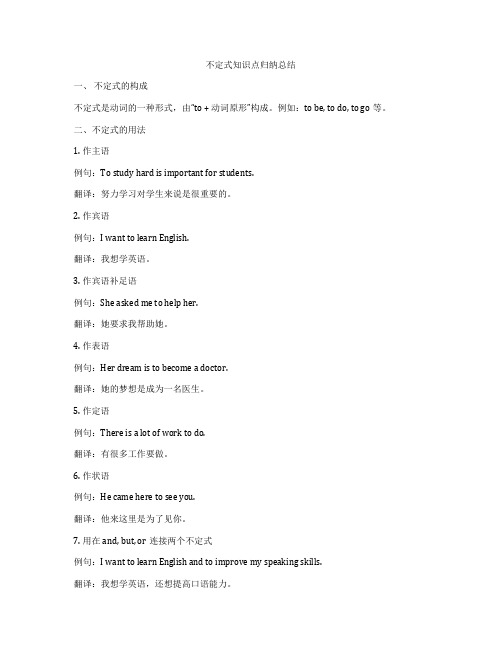
不定式知识点归纳总结一、不定式的构成不定式是动词的一种形式,由“to + 动词原形”构成。
例如:to be, to do, to go等。
二、不定式的用法1. 作主语例句:To study hard is important for students.翻译:努力学习对学生来说是很重要的。
2. 作宾语例句:I want to learn English.翻译:我想学英语。
3. 作宾语补足语例句:She asked me to help her.翻译:她要求我帮助她。
4. 作表语例句:Her dream is to become a doctor.翻译:她的梦想是成为一名医生。
5. 作定语例句:There is a lot of work to do.翻译:有很多工作要做。
6. 作状语例句:He came here to see you.翻译:他来这里是为了见你。
7. 用在and, but, or连接两个不定式例句:I want to learn English and to improve my speaking skills.翻译:我想学英语,还想提高口语能力。
8. 与形容词和副词连用例句:I'm happy to meet you.翻译:见到你我很高兴。
9. 用在名词前表示目的,结果等例句:He gave us some advice to help us study better. 翻译:他给了我们一些建议,帮助我们更好地学习。
三、不定式的特殊用法1. with + 宾语 + 不定式例句:He left me with nothing to say.翻译:他让我无话可说。
2. for + 宾语 + to 不定式例句:We have a lot of work for you to do.翻译:我们有很多工作需要你做。
3. 不定式的被动形式例句:The book is difficult to finish.翻译:这本书难以完成。
动词不定式和动名词的用法

非谓语动词不定式(infinitive)1.不定式的用法不定式的基本形式为“to do", 在句中不单独作谓语;本身具有名词、形容词和副词的特征,在句中充当主语、宾语、表语、定语、状语和补足语。
(1)作主语:例:To see is to believe. 眼见为实。
To grasp English in a short time is not easy.在短时间内掌握英语不容易。
注意:为保持句子平衡,可用“it”作形式主语,而将真正主语动词不定式放在后边,句型为:It is /was…to do sth.例:It is not easy to grasp English in a short time.在短时间内掌握英语是不容易的。
It was important for him to solve the problem then。
当时对于他来说,解决这个问题是重要的。
(2)作宾语:多在单宾语及物动词后用作宾语,有时也可用在某些复合宾语及物动词及个别双宾语及物动词后。
例:I want to have a walk after supper。
晚饭后我想去散步.He considered it his duty to support his family。
他认为支撑他的家庭是他的责任。
She doesn’t know how to run the machine。
她不知道如何操作这台机器。
不定式作宾语的结构为:及物动词+ to do. 动词常用:advise, agree,ask,begin, continue, decide,expect,forget, hope, learn,like, manage, mean, pretend,start, try,want,wish等。
(3)作表语:联系动词一般都是be。
例:Our duty is to clean the office and the windows in it.我们的责任是打扫办公室以及把办公室里的窗户擦干净。
be+动词不定式

be +动词不定式(即be + to do sth.)的用法如下:1.表示按计划或安排要做的事.例如:When are you to leave for home你什么时候回家She is to be married next month.她将于下个月结婚.The Queen is to visit Japan in a week’s time.女王将于一周后访问日本. 这种结构也可用于过去.was / were to do sth.表示曾经计划要做的事,但不表明计划是否被执行,或表示“命运(即命中注定要发生的事)”,而非计划;was / were to have done sth.表示未曾实现的计划.例如:I felt nervous because I was soon to leave home for the first time.我感到很紧张,因为我很快就要首次离开家了.They said goodbye,little knowing that they were never to meet again.他们告了别,不知道以后再也不会见面了.We were to have told you,but you were not in.我们本来想告诉你的,但是你不在家.2.表示“应该”,相当于should,ought to.例如:You are to report to the police.你应该报警.What is to be done应该怎么办呢3.表示“必须”,相当于must,have to.例如:The letter is to be handed to him in person.这封信必须亲手交给他.You are to do your homework before you watch TV.看电视之前你得先做完作业.4.表示“想,打算”,相当于intend,want.例如:If we are to be there before ten,we’ll have to go now.如果我们要在十点前到,我们现在就得走.5.用于第一人称疑问句,表示征求对方意见.例如:Am I to go on with the work要我继续完成这项工作吗What are we to do next我们下一步该怎么办6.用于否定句,表示“禁止”,相当于mustn’t.例如:The books in this room are not to be taken outside.这个室内的书籍不得带出室外.You are not to smoke in the reading-room.你不可以在阅览室里吸烟.7.表示“可以,可能”,相当于may,can.例如:The news is to be found in the evening paper.这条消息可以在晚报上见到. Such people are to be found everywhere.这种人到处都有.She is nowhere to be found.在哪里也找不着她.to do sth.用于if或even if / even though从句中,表示对未来的假设.例如:If I were to tell you that I killed him,would you believe me要是我告诉你是我杀了他,你会相信吗Even if the sun were to rise in the west,I would never do such a thin g.即使太阳从西边出来,我也决不做这种事.to blame(该受责备,对某坏事应负责任)与be to let(待出租)两种结构中,用不定式的主动形式表示被动含义.例如:Which driver is to blame for the accident这事故是哪个司机的责任This house is to let.这房子要出租.Exercise?have been looking for the boy all the afternoon but he is nowhere __ ___.see be seen?early as his second film,Chaplin had developed his own manner of act ing,the one that ___ world famous.become to become become?just saw John at the bookstore.----That’s strange; I didn’t think he ____ back until tomorrow.come to come coming to come?final examination ___early July.to be held to be taken place?going to hold be to take place?the sun ___ tomorrow,what would we donot to raise not rise?not rise not to rise?new hospital was to ____ in this district,but the money wasn’t c oll ected yet.been built built built?at these .’s going to rain ’s raining?is to rain can rain?do you think ____ for the failure of their marriage.blame be blame to blame to be blamed?you nor he ____ to the front.to be sent to be sent to be sent to send?____ to bed when there was a knock at the door.going to to go about to go?we ____ again next week----Yes,let’s make it next Wednesday.; to meet ; be to meet?; meet ; meeting?students,we ____.’t smoke not to smoke?’t smoking ’t smoke? Key:作业帮用户2017-10-13。
动词不定式的基本用法归纳

动词不定式的基本用法归纳动词不定式的基本用法归纳一、动词不定时的形式肯定式:肯定式:to do sth 否定式:否定式:not to do sth. 被动式:被动式:to be done 完成式:完成式:to have done二、动词不定式的用法1.作主语A. 动词不定式作主语,谓语动词用单数形式。
动词不定式作主语,谓语动词用单数形式。
如:(1)To see is to believe. (2)To master English gives us much help in the study of sience. B. 不定式或不定式短语作主语时,常用作形不定式或不定式短语作主语时,常用it作形式主语,构成“ 形容词(+for sb.)不定式” 不定式” 式主语,构成“It is + 形容词不定式结构。
结构。
It is impossible for him to give up smoking.2.作宾语A.动词后直接不定式作宾语的动词有许多,如 .动词后直接不定式作宾语的动词有许多,want, decide, intend, fail, wish, export, pretend, choose等等。
等等。
等等I mean to go there at once. B.不定式短语作宾语时,如果还带有宾语补足语,不定式短语作宾语时,如果还带有宾语补足语,不定式短语作宾语时往往把不定式短语放在宾补之后,而用it作形式往往把不定式短语放在宾补之后,而用作形式宾语。
句型为“主语+find(feel, think, believe, 宾语。
句型为“主语consider, etc) +it+形容词名词形容词/名词形容词名词+to do sth”。
I think it necessary to report the thing to the teacher. I find it interesting to work with him.C.动词不定式还可以用作介词宾语,但仅限于 .动词不定式还可以用作介词宾语,介词except和but(除了)。
动词不定式的用法总结
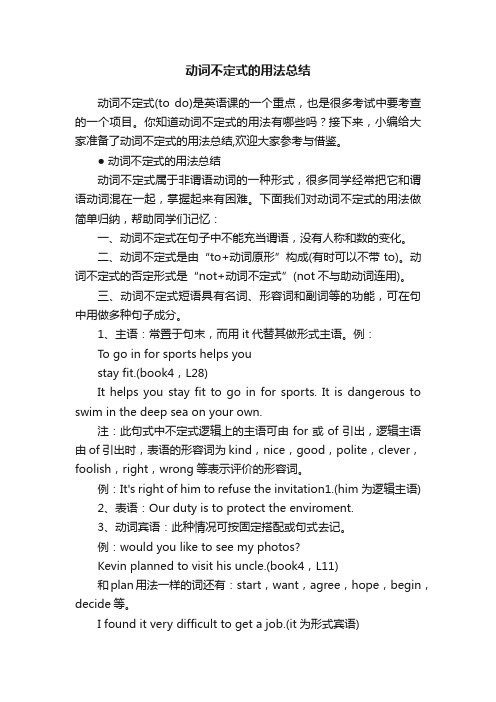
动词不定式的用法总结动词不定式(to do)是英语课的一个重点,也是很多考试中要考查的一个项目。
你知道动词不定式的用法有哪些吗?接下来,小编给大家准备了动词不定式的用法总结,欢迎大家参考与借鉴。
●动词不定式的用法总结动词不定式属于非谓语动词的一种形式,很多同学经常把它和谓语动词混在一起,掌握起来有困难。
下面我们对动词不定式的用法做简单归纳,帮助同学们记忆:一、动词不定式在句子中不能充当谓语,没有人称和数的变化。
二、动词不定式是由“to+动词原形”构成(有时可以不带to)。
动词不定式的否定形式是“not+动词不定式”(not不与助动词连用)。
三、动词不定式短语具有名词、形容词和副词等的功能,可在句中用做多种句子成分。
1、主语:常置于句末,而用it代替其做形式主语。
例:To go in for sports helps youstay fit.(book4,L28)It helps you stay fit to go in for sports. It is dangerous to swim in the deep sea on your own.注:此句式中不定式逻辑上的主语可由for或of引出,逻辑主语由of引出时,表语的形容词为kind,nice,good,polite,clever,foolish,right,wrong等表示评价的形容词。
例:It's right of him to refuse the invitation1.(him为逻辑主语)2、表语:Our duty is to protect the enviroment.3、动词宾语:此种情况可按固定搭配或句式去记。
例:would you like to see my photos?Kevin planned to visit his uncle.(book4,L11)和plan用法一样的词还有:start,want,agree,hope,begin,decide等。
带to的动词不定式

带to的动词不定式(即动词原形)的常见用法:★希望做某事hope to do sth.★决定做某事decide to do sth★同意做某事agree to do sth.★需要某人做某事need to do sth.★使用某物做某事use sth to do sth★准备做某事get/be ready to do★计划做某事plan to do sth.★希望某人做某事wish sb. to do sth.★轮流做某事take one’s turns to do sth.★拒绝做某事refuse to do sth.★告诉某人做某事tell sb. to do sth.★请某人做某事ask sb. to do sth.★想要某人做某事want /would like sb. to do sth.★不得不have to do★同意某人做某事agree sb. to do sth.★教某人做某事teach sb. to do sth.★喜欢/想要某人做某事like sb. to do sth.★鼓励某人做encourage sb to do★帮助某人做某事help sb. to do sth/help sb.do★轮到某人做某事It’s one’s turn to do sth.★是某人做某事时候了It’s time(for sb.) to do sth.★对于某人来说做某事是It’s +adj. for/of sb. to do sth.★某人做某事花了某时间It takes sb. sometime to do sth.★太…..而不能too+adj./adv. to do sth.★find/think/feel it +adj. to do sth.发现/认为/感到做某事是…★序数词+to do 第…..个做某事★I didn't know/forgot what to do.我不知/忘记了怎么办★be+adj+to do sth以下是不带to的动词不定式(即动词原形)的常见用法★让某人做某事am let sb. do sth★使得某人做某事make do sth★听见某人做某事hear do sth do sth★看见某人做某事see do sth do sth★为什么不...?why not/why don’t you +动原?★某人最好(不)做某事某人+had better( not)do★情态动词can/may /must /should+ 动词原(包括情态动词的否定形式+动词原形)★助动词do/does/did/will/would在构成疑问句或者构成否定句即don’t /doesn’t /didn’t /will not /would not+ 动词原形★ be going to + 动词原形(表示“即将”“打算” 做某事)。
不定式的用法
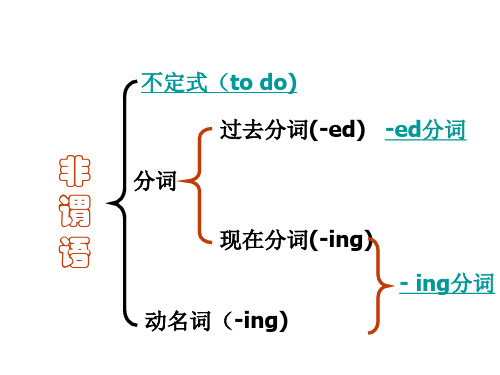
过去分词(-ed) -ed分词
非 分词
谓
语
现在分词(-ing)
- ing分词
动名词(-ing)
不定式的句法功能:
1)作主语 2)作宾语 3)作表语 4)作宾语补足语 5)作定语 6)作状语 7)作插入语 8)作同位语
动词不定式的时态和语态
主动式
被动式
一般式 to do
to be done
such a short time. It is considerate /kind of you to say so
与of 连用的形容词常反映人的品行和性 格特征,最常用的有:
brave careful careless nice good kind strange honest polite impolite stupid clever cruel foolish rude wise thoughtful considerate
My little sister is learning how to read and write.
我的小妹妹正在学习如何阅读和书写。
My mother showed me how to prepare meals.
母亲向我演示了如何做饭。
I wonder where togo.我不知道去哪儿。
2) 疑问词+不定式 作主语
1.When to go to visit that village has not been decided yet
2. It was not easy to decide what to take and what to leave behind
2,可作表语
1).如果主语是不定式(表示条件),表语也是不 定式(表示结果)。(一致性)
be +动词不定式(即be + to do sth.)的用法

be +动词不定式(即be + to do sth.)的用法如下:1.表示按计划或安排要做的事。
例如:When are you to leave for home?你什么时候回家?She is to be married next month.她将于下个月结婚。
The Queen is to visit Japan in a week’s time.女王将于一周后访问日本。
这种结构也可用于过去。
was / were to do sth. 表示曾经计划要做的事,但不表明计划是否被执行,或表示“命运(即命中注定要发生的事)”,而非计划;was / were to have done sth.表示未曾实现的计划。
例如:I felt nervous because I was soon to leave home for the first time.我感到很紧张,因为我很快就要首次离开家了。
They said goodbye, little knowing that they were never to meet again.他们告了别,不知道以后再也不会见面了。
We were to have told you, but you were not in.我们本来想告诉你的,但是你不在家。
2.表示“应该”,相当于should, ought to。
例如:You are to report to the police.你应该报警。
What is to be done?应该怎么办呢?3.表示“必须”,相当于must, have to。
例如:The letter is to be handed to him in person.这封信必须亲手交给他。
You are to do your homework before you watch TV.看电视之前你得先做完作业。
4.表示“想,打算”,相当于intend, want。
be to do 的用法
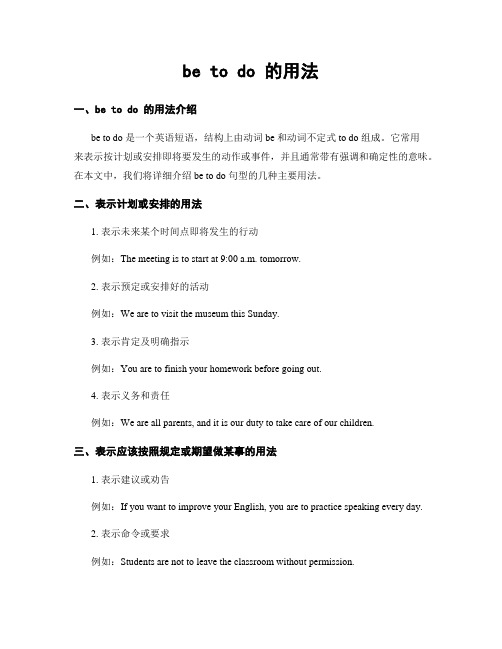
be to do 的用法一、be to do 的用法介绍be to do 是一个英语短语,结构上由动词 be 和动词不定式 to do 组成。
它常用来表示按计划或安排即将要发生的动作或事件,并且通常带有强调和确定性的意味。
在本文中,我们将详细介绍 be to do 句型的几种主要用法。
二、表示计划或安排的用法1. 表示未来某个时间点即将发生的行动例如:The meeting is to start at 9:00 a.m. tomorrow.2. 表示预定或安排好的活动例如:We are to visit the museum this Sunday.3. 表示肯定及明确指示例如:You are to finish your homework before going out.4. 表示义务和责任例如:We are all parents, and it is our duty to take care of our children.三、表示应该按照规定或期望做某事的用法1. 表示建议或劝告例如:If you want to improve your English, you are to practice speaking every day.2. 表示命令或要求例如:Students are not to leave the classroom without permission.3. 表示某人被期待做某事例如:The new employee is to follow the company's regulations.四、表示命运、结果或可能性的用法1. 表示必然发生的结果例如:If you keep procrastinating, you are to fail the exam.2. 表示可能性或假设例如:If it continues to rain, we are to postpone the outdoor event.3. 表示命运的安排例如:He was meant to be a great musician and his talent is undeniable.五、注意事项1. be to do 句型常与一些具体的时间状语连用,以确保时间表达的准确性。
2005年高考英语第二轮总复习讲座之九Unit9非谓语动词

2005年高考英语第二轮总复习讲座之九Unit9 非谓语动词一、考点聚焦1、非谓语动词的句法功能名称语法功能主语宾语宾语补足语表语定语状语不定式√ √ √ √ √ √动名词√ √ √ √现在分词√ √ √ √过去分词√ √ √ √2、动词不定式复心中应注意的几个问题(1)不定式作表语与“be + to do sth.”的异同。
不定式作表语说明主语的内容或性质。
His job is to guard.(说明内容)be + to do sth.(表示按计划要做的事)(2)带不定式作宾语的词语。
下列词语常不定式作宾语:afford、promise、refuse、expect、hope、learn、offer、wish、want、fail、plan、agree、forget、like、prefer、decide、manage、try、arrange、determine、desire等。
下列动词后可接疑问词+不定式:teach、decide、wonder、show、learn、forget、ask、find、out、advise、discuss等。
(3)如何理解和使用不定式作宾补。
①动词see、watch、notice、hear、listen to、observe、feel、taste、smell、make、let、have等的宾补用动词原形,变被动时要加to,此时的不定式就是主语补足语。
②常用带不定式作宾补的几种情况:主语 + ask / require / tell / order / force / get / want / like + sb.to do sth.③主语+ think / judge / suppose / believe / consider/imagine/consider / feel + sb. + to be/ to have done④主语 + call on / upon / depend on / wait for / ask for + sb.+ to do sth.(4)不定式作定语的特殊用法。
英语tobe有哪些用法?

英语tobe有哪些用法?你好,你所说的to be其实是to do(sth),在英语中它属于非谓语动词,我们把它称作'动词不定式'.所谓'非谓语动词',顾名思义,它不是谓语动词.英语中的非谓语动词有三种形式:动词ing形式,动词的过去分词和动词的不定式.动词不定式由to加上动词原形构成,不定式尽管不是谓语动词,但是它还是动词,所以它也可以有自己的宾语,状语,甚至(逻辑)主语等.动词不定式在句子中可以充当除谓语以外的其他句子成分,如主语,宾语,表语,定语,状语,补足语.你的问题就是关于'不定式'的,只不过这里动词是be,而不是其他实意动词罢了.既然是be动词(我们常常把它叫系动词),它就可以接'形容词''名词''介词短语'等做表语.就拿你的例句来说;第一句中,句子谓语动词是don't need,宾语就是to be nervous.而实意动词need(需要),它的常见用法就是need sth'需要某物',也就是加名词/代词作宾语,或者用need to do sth,接不定式作宾语.可是这句话里nervous(紧张的)既不是名词/代词,也不是动词,而是形容词;我们知道形容词在句子中往往是做表语(跟在系动词后)和定语(修饰名词),它不能做宾语.那么,need需要宾语,nervous不能做宾语,怎么办?我们的不定式就闪亮登场了,to加上be nervous系表结构一起充当need的宾语了.既然这样,肯定不能说成:you don't need nervous.第二句话,是want的用法,want sb to do (sth)'想要/希望某人做某事',在这个结构中,不定式作宾语补足语.不定式结构是to be the first to know,仍然是be动词的不定式,至于to know是又一个不定式结构作the first这个名词的定语.所以这个句子直译就是'我希望你是知道(这事)的第一个人'.至于i want you first to know,我觉得可以,因为就意思而言,这句话也表达了'想先让你知道'.而就句子结构而言这句也是正确的,该句中first作副词,修饰动词want.但是跟原句比,它的侧重点不同,该句可这样理解:'我首先想...',可能还有其次的进一步想法.不过i want you first to know似乎并不多见.倒不如 first i want you to know (首先我想让你知道)或i want you to know first.(我想让你先知道)更常见.个人愚见,敬请方家指教.。
be to do的用法
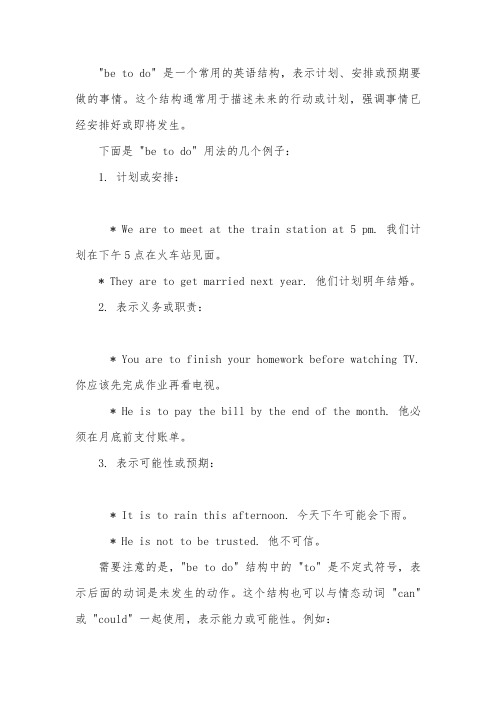
"be to do" 是一个常用的英语结构,表示计划、安排或预期要做的事情。
这个结构通常用于描述未来的行动或计划,强调事情已经安排好或即将发生。
下面是 "be to do" 用法的几个例子:
1. 计划或安排:
* We are to meet at the train station at 5 pm. 我们计划在下午5点在火车站见面。
* They are to get married next year. 他们计划明年结婚。
2. 表示义务或职责:
* You are to finish your homework before watching TV. 你应该先完成作业再看电视。
* He is to pay the bill by the end of the month. 他必须在月底前支付账单。
3. 表示可能性或预期:
* It is to rain this afternoon. 今天下午可能会下雨。
* He is not to be trusted. 他不可信。
需要注意的是,"be to do" 结构中的 "to" 是不定式符号,表示后面的动词是未发生的动作。
这个结构也可以与情态动词 "can" 或 "could" 一起使用,表示能力或可能性。
例如:
* She can't be to do it all by herself. 她不可能一个人完成所有的事情。
初中动词不定式用法
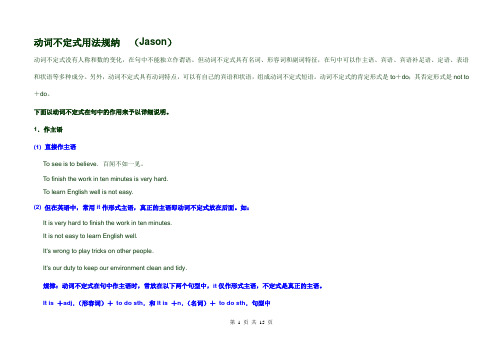
动词不定式用法规纳(Jason)动词不定式没有人称和数的变化,在句中不能独立作谓语。
但动词不定式具有名词、形容词和副词特征,在句中可以作主语、宾语、宾语补足语、定语、表语和状语等多种成分。
另外,动词不定式具有动词特点,可以有自己的宾语和状语,组成动词不定式短语。
动词不定式的肯定形式是to+do;其否定形式是not to +do。
下面以动词不定式在句中的作用来予以详细说明。
1.作主语(1) 直接作主语To see is to believe.百闻不如一见。
To finish the work in ten minutes is very hard.To learn English well is not easy.(2) 但在英语中,常用it作形式主语,真正的主语即动词不定式放在后面。
如:It is very hard to finish the work in ten minutes.It is not easy to learn English well.It's wrong to play tricks on other people.It's our duty to keep our environment clean and tidy.规律:动词不定式在句中作主语时,常放在以下两个句型中,it仅作形式主语,不定式是真正的主语。
It is +adj.(形容词)+to do sth.和It is +n.(名词)+to do sth.句型中第 1 页共15 页下面我们来具体看一下这两个句型的用法:①常用形容词作it is的表语。
真正主语不定式通常有逻辑主语,一般用for/of短语来表示,即for/of sb.to do sth.(其中sb.就是to do的逻辑主语)It's important for us to keep the water clean.保持水质清洁对我们来说是很重要的。
be+动词不定式(即be+todosth.)
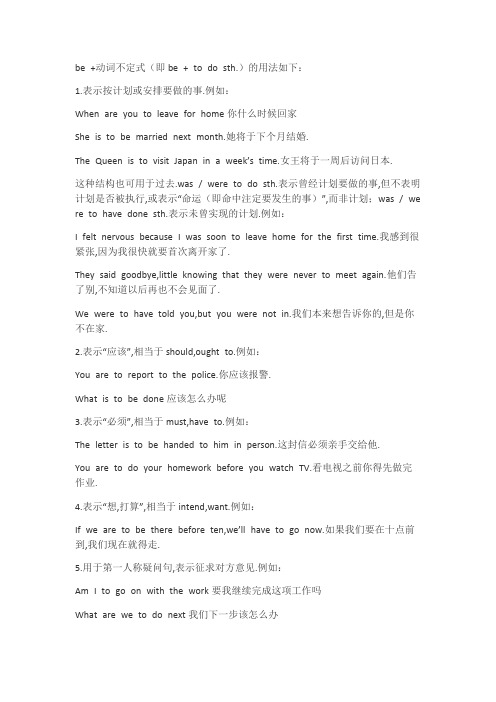
be +动词不定式(即be + to do sth.)的用法如下:1.表示按计划或安排要做的事.例如:When are you to leave for home你什么时候回家She is to be married next month.她将于下个月结婚.The Queen is to visit Japan in a week’s time.女王将于一周后访问日本.这种结构也可用于过去.was / were to do sth.表示曾经计划要做的事,但不表明计划是否被执行,或表示“命运(即命中注定要发生的事)”,而非计划;was / we re to have done sth.表示未曾实现的计划.例如:I felt nervous because I was soon to leave home for the first time.我感到很紧张,因为我很快就要首次离开家了.They said goodbye,little knowing that they were never to meet again.他们告了别,不知道以后再也不会见面了.We were to have told you,but you were not in.我们本来想告诉你的,但是你不在家.2.表示“应该”,相当于should,ought to.例如:You are to report to the police.你应该报警.What is to be done应该怎么办呢3.表示“必须”,相当于must,have to.例如:The letter is to be handed to him in person.这封信必须亲手交给他.You are to do your homework before you watch TV.看电视之前你得先做完作业.4.表示“想,打算”,相当于intend,want.例如:If we are to be there before ten,we’ll have to go now.如果我们要在十点前到,我们现在就得走.5.用于第一人称疑问句,表示征求对方意见.例如:Am I to go on with the work要我继续完成这项工作吗What are we to do next我们下一步该怎么办6.用于否定句,表示“禁止”,相当于mustn’t.例如:The books in this room are not to be taken outside.这个室内的书籍不得带出室外.You are not to smoke in the reading-room.你不可以在阅览室里吸烟.7.表示“可以,可能”,相当于may,can.例如:The news is to be found in the evening paper.这条消息可以在晚报上见到. Such people are to be found everywhere.这种人到处都有.She is nowhere to be found.在哪里也找不着她.to do sth.用于if或even if / even though从句中,表示对未来的假设.例如:If I were to tell you that I killed him,would you believe me要是我告诉你是我杀了他,你会相信吗Even if the sun were to rise in the west,I would never do such a thing.即使太阳从西边出来,我也决不做这种事.to blame(该受责备,对某坏事应负责任)与be to let(待出租)两种结构中,用不定式的主动形式表示被动含义.例如:Which driver is to blame for the accident这事故是哪个司机的责任This house is to let.这房子要出租.Exercisehave been looking for the boy all the afternoon but he is nowhere _____.see be seenearly as his second film,Chaplin had developed his own manner of acting,th e one that ___ world famous.become to become becomejust saw John at the bookstore.----That’s strange; I didn’t think he ____ back until tomorrow.come to come coming to comefinal examination ___early July.to be held to be taken placegoing to hold be to take placethe sun ___ tomorrow,what would we donot to raise not risenot rise not to risenew hospital was to ____ in this district,but the money w asn’t collected ye t.been built built builtat these .’s going to rain ’s rainingis to rain can raindo you think ____ for the failure of their marriage.blame be blame to blame to be blamedyou nor he ____ to the front.to be sent to be sent to be sent to send____ to bed when there was a knock at the door.going to to go about to gowe ____ again next week----Yes,let’s make it next Wednesday.; to meet ; be to meet; meet ; meetingstudents,we ____.’t smoke not to smo ke’t smoking ’t smokeKey:作业帮用户2017-10-13。
be to do用法详解

“be+动词不定式”一、表示将来或预计I don’t know what is to happen to us. 我不知道我们会发生什么事。
I went to have a look at the room where I was to talk that afternoon. 我去看了一下地方,当天下午我要在那里讲话。
It was 1491. Columbus was to reac h America a year later. 那是1491年,一年后哥伦布到达了美洲。
说明:当该结构中用了still 或yet 时,其将来意义更加突出。
如:The worst is still to come. 还有最糟糕的事情要发生。
The most severe weather is yet [still] to come. 最恶劣的天气还没有到。
The best item on the programme is still to come. 最好看的节目还在后头。
注意,该结构表示将来的用法是有限的,原则上,只有当表示的动作为人所控制时才可使用它来表示将来,否则就是错的。
如可说I’m goi ng to play tennis,也可说I’m to play tennis,因为其中的play tennis是可以人为控制的。
而在以下各例中,其中的动作均不能为人所限制,所以going不可省略:He’s going to be fat. 他要发胖了。
There is going to be a storm. 要下暴风雨了。
You’re going to break that c hair. 你会把那把椅子弄坏的。
二、表示计划或意图They are to be married. 他们打算结婚。
We are to be married in June. 我们计划在6月结婚。
说明:该结构也可用于条件状语从句。
如:If I’m to be there on time, I must le ave at once. 如果我要想准时赶到那儿,我就必须马上动身。
be left to do sth的用法
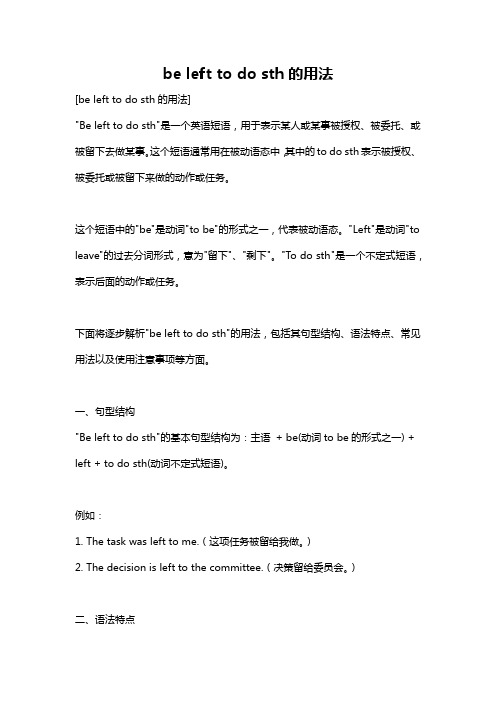
be left to do sth的用法[be left to do sth的用法]"Be left to do sth"是一个英语短语,用于表示某人或某事被授权、被委托、或被留下去做某事。
这个短语通常用在被动语态中,其中的to do sth表示被授权、被委托或被留下来做的动作或任务。
这个短语中的"be"是动词"to be"的形式之一,代表被动语态。
"Left"是动词"to leave"的过去分词形式,意为"留下"、"剩下"。
"To do sth"是一个不定式短语,表示后面的动作或任务。
下面将逐步解析"be left to do sth"的用法,包括其句型结构、语法特点、常见用法以及使用注意事项等方面。
一、句型结构"Be left to do sth"的基本句型结构为:主语+ be(动词to be的形式之一) + left + to do sth(动词不定式短语)。
例如:1. The task was left to me.(这项任务被留给我做。
)2. The decision is left to the committee.(决策留给委员会。
)二、语法特点1. "Be left"部分采用被动语态,表示某人或某事物被授权或留下做某事。
2. 动词"leave"在此短语中充当系动词,用来把"be"和"to do sth"连接起来,表示状态或结果。
3. "To do sth"用来表示被委托、被授权的动作或任务。
三、常见用法1. 表示任务或工作的委托和授权例句:The project was left to John and Sarah.(这个项目被委托给了约翰和莎拉。
be ready to和be ready for的区别

be ready to和be ready for的区别be ready to指随时可(乐意做某事),后面跟动词原型;be ready for指为...做好准备,后面跟名词。
I am ready to help you.我随时可帮助你(乐意)be ready to和be ready for的区别一、使用场合不同1.be ready to do sth解析:to do动词不定式,为非谓语动词。
在英语语法中,动词不定式是指动词中的一种不带词形变化从而不指示人称、数量、时态的一种形式。
它之所以被称做不定式,是因为动词不被限定,或者说不被词形变化所局限。
不定式属于非谓语动词形式。
2.be ready for sth解析:for往往含有“向前方的目标运动”的意思。
二、含义不同1.be ready to do sth释义:准备做某事。
2.be ready for sth释义:为某事而准备好。
三、用法不同1.be ready to do sth用法:指随时可(乐意做某事)后面跟动词原型。
例句:He may now be ready to sanction the use of force译文:他现在可能打算批准使用武力。
2.be ready for sth用法:指为...做好准备,后面跟名词。
例句:I think he may be ready for a sleep soon.译文:我想他也许很快就要睡一觉了。
ready的用法ready可以用作形容词ready在句中多用作表语,基本意思是“准备”,指某人做某事之前已有所准备; 也可作“乐意的,情愿的”解,指人决心做某事,愿意并急欲采取行动; ready也可作“可能做某事的”解; 还可作“迅速的,立即的”解,此时可用作定语。
ready在句中用作表语时其后可接动词不定式(不接动名词),也可接介词短语。
too ready to- v 不含否定意义,而含肯定意义,即“易于…的”“太…以至于”。
动词不定式to do和to be在用法上的差异

动词不定式to do和to be在用法上的差异
张同乐
【期刊名称】《语言教育》
【年(卷),期】1995(000)006
【摘要】<正> 不定式是非谓语动词的一种形式,它既具有动词的特征,又兼备名词、形容词或副词的句法功能。
本文就不定式to do和to be的用法及用法上的差异,
作一简单的介绍。
一、不定式to do在有些动词后充当宾补时,要省去不定式符号to。
这些
【总页数】3页(P37-39)
【作者】张同乐
【作者单位】
【正文语种】中文
【中图分类】G634.41
【相关文献】
1.带-ся动词和不带-ся动词在用法上的区别 [J], 宋红娟;
2.海商法上的担保与担保法上担保的差异 [J], 毛亚敏
3.谈英语动名词与动词不定式在意思和用法上的区别 [J], 林明育
4.几组反意动词在用法上的区别 [J], 石继忠
5.试论名词后的-ing分词和形容词性分句在用法上和意义上的差异 [J], 彭正银
因版权原因,仅展示原文概要,查看原文内容请购买。
不定式

help后的不定式作宾补(包括作宾语)to 可有可无。
不跟宾语vt是及物动词, 后加宾语,还有vi只能 作瞬间动词,不能作 延续性动词
表示 “将”、“计划”、“安排”。(意思接近于be going to) 如: Their daughter is to get married soon.
非谓语动词 之
动词不定式
不定式
definition
由“to+动词原形”构成,其否定形式是“not to do”。 不定式可以带宾语或状语构成不定式短语。 不定式没有人称和数的变化,有时态和语态的变 化。 不定式可以作主语、宾语、状语、表语和定语。 不定式复合结构为“介词+sb.(sth.)+to do”,其 中“介词+sb.(sth.)”表明不定式动作的发出者, 为逻辑主语。
不定式的时态与语态
(1)不定式的一般式所表示的动作通常与谓语的动作(状态)同时(或几乎同时) 发生,或是 在它之后发生。 I’m sorry to tell you that you are wrong this time. 我很遗憾告诉你这次是你错了。 (2)如果谓语表示的动作(情况)发生时,不定式表示的动作正在进行, 这时不定式就要用进 行式。 I am very glad to be talking with you. 我很高兴与你交谈。
不定式的用法 表语是
什么
(4)作表语。 My job is to help the patient. 我的工作是帮助病人。 要注意不定式作表语与“be to do”结构的不 同: 不定式作表语说明主语的性质或内容, 而“be to do”结构表示安排要做的事情。
在形式上,位于系动词 后的就是表语。从含义 上讲,表语是回答主语 “是什么”或“怎么样” 的语法成分。即是指 “是”字句“是”字后 面的成分。表语由名词、 形容词或相当于它们的 词或短语等充当,和系 动词一起构成谓语。
- 1、下载文档前请自行甄别文档内容的完整性,平台不提供额外的编辑、内容补充、找答案等附加服务。
- 2、"仅部分预览"的文档,不可在线预览部分如存在完整性等问题,可反馈申请退款(可完整预览的文档不适用该条件!)。
- 3、如文档侵犯您的权益,请联系客服反馈,我们会尽快为您处理(人工客服工作时间:9:00-18:30)。
be +动词不定式(即be + to do sth.)的用法如下:
1.表示按计划或安排要做的事。
例如:
When are you to leave for home?你什么时候回家?
She is to be married next month.她将于下个月结婚。
The Queen is to visit Japan in a week’s time.女王将于一周后访问日本。
这种结构也可用于过去。
was / were to do sth. 表示曾经计划要做的事,但不表明计划是否被执行,或表示“命运(即命中注定要发生的事)”,而非计划;was / were to have done sth.表示未曾实现的计划。
例如:
I felt nervous because I was soon to leave home for the first time.我感到很紧张,因为我很快就要首次离开家了。
They said goodbye, little knowing that they were never to meet again.他们告了别,不知道以后再也不会见面了。
We were to have told you, but you were not in.我们本来想告诉你的,但是你不在家。
2.表示“应该”,相当于should, ought to。
例如:
You are to report to the police.你应该报警。
What is to be done?应该怎么办呢?
3.表示“必须”,相当于must, have to。
例如:
The letter is to be handed to him in person.这封信必须亲手交给他。
You are to do your homework before you watch TV.看电视之前你得先做完作业。
4.表示“想,打算”,相当于intend, want。
例如:
If we are to be there before ten, we’ll have to go now.如果我们要在十点前到,我们现在就得走。
5.用于第一人称疑问句,表示征求对方意见。
例如:
Am I to go on with the work?要我继续完成这项工作吗?
What are we to do next?我们下一步该怎么办?
6.用于否定句,表示“禁止”,相当于mustn’t。
例如:
The books in this room are not to be taken outside.这个室内的书籍不得带出室外。
You are not to smoke in the reading-room.你不可以在阅览室里吸烟。
7.表示“可以,可能”,相当于may, can。
例如:
The news is to be found in the evening paper.这条消息可以在晚报上见到。
Such people are to be found everywhere.这种人到处都有。
She is nowhere to be found.在哪里也找不着她。
8.were to do sth.用于if或even if / even though从句中,表示对未来的假设。
例如:
If I were to tell you that I killed him, would you believe me?要是我告诉你是我杀了他,你会相信吗?
Even if the sun were to rise in the west, I would never do such a thing.即使太阳从西边出来,我也决不做这种事。
9.be to blame(该受责备,对某坏事应负责任)与be to let(待出租)两种结构中,用不定式的主动形式表示被动含义。
例如:
Which driver is to blame for the accident?这事故是哪个司机的责任?
This house is to let.这房子要出租。
Exercise
1. We have been looking for the boy all the afternoon but he is nowhere _____.
A. to see
B. seeing
C. seen
D. to be seen
2. As early as his second film, Chaplin had developed his own manner of acting, the one that ___ world famous.
A. would become
B. became
C. was to become
D. had become
3. ----We just saw John at the bookstore.
----That’s strange; I didn’t think he ____ back until tomorrow.
A. will come
B. was to come
C. is coming
D. is to come
4. The final examination ___early July.
A. is to be held
B. is to be taken place
C. is going to hold
D. will be to take place
5. If the sun ___ tomorrow, what would we do?
A. were not to raise
B. does not rise
C. would not rise
D. were not to rise
6. A new hospital was to ____ in this district, but the money wasn’t collected yet.
A. have been built
B. be built
C. built
D. have built
7. Look at these clouds. ____.
A. It’s going to rain
B. It’s raining
C. It is to rain
D. It can rain
8. Who do you think ____ for the failure of their marriage.
A. to blame
B. to be blame
C. is to blame
D. is to be blamed
9. Neither you nor he ____ to the front.
A. are to be sent
B. is to be sent
C. have to be sent
D. is to send
10. I ____ to bed when there was a knock at the door.
A. went
B. am going to
C. was to go
D. was about to go
11.----____ we ____ again next week?
----Yes, let’s make it next Wednesday.
A. Are; to meet
B. Shall; be to meet
C. Will; meet
D. Are; meeting
12. As students, we ____.
A. won’t smoke
B. are not to smoke
C. aren’t smoking
D. don’t smoke
Key: 1.D 2.C 3.B 4.A 5.D 6.A 7.A 8.C 9.B 10.D 11.A 12.B。
